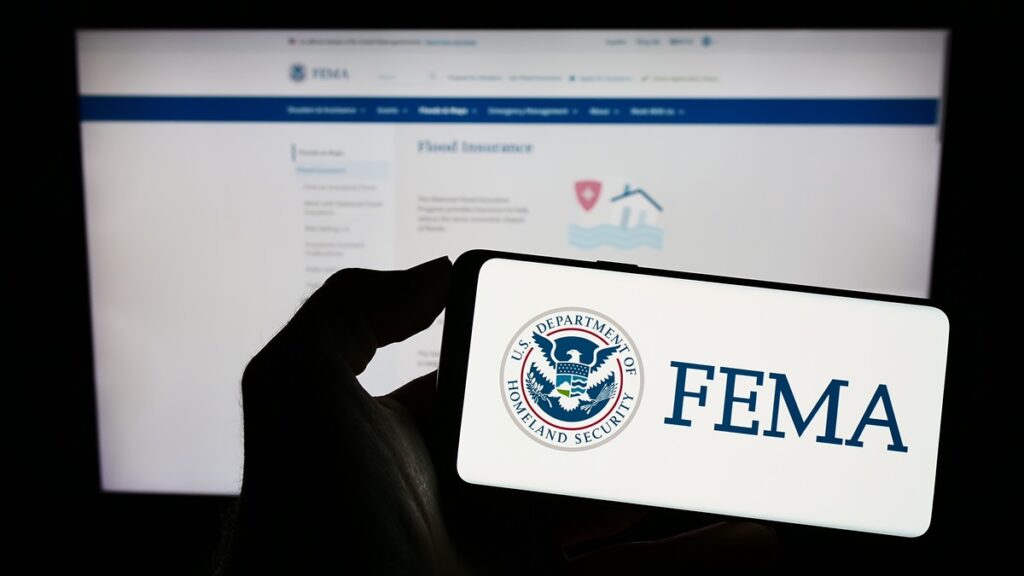A contingent of Congressional Democrats have sent a letter to Homeland Security Secretary Kristi Noem demanding that she not follow through with the Trump administration’s plans to eliminate the Federal Emergency Management Agency (FEMA).
Secretary Noem recently announced in a cabinet meeting “we’re going to eliminate FEMA” contrary to previously saying at her nomination hearing that she “will enhance our emergency preparedness and strengthen FEMA’s capabilities.”
The letter—signed by a group including Committee on Financial Services Ranking Member Rep. Maxine Waters, Committee on Homeland Security Ranking Member Rep. Bennie G. Thompson, Committee on Transportation and Infrastructure Ranking Member Rep. Rick Larsen, Committee on Appropriations Ranking Member Rep. Rosa DeLauro, and Committee on Science, Space and Technology Ranking Member Rep. Zoe Lofgren—voiced concern over mounting reports of FEMA being dismantled and the ongoing steps being taken to fire employees and reduce funding from disaster recovery and preparedness grants.
“The Trump administration’s plan to dismantle FEMA will make Americans less safe,” wrote the Democratic contingent in the letter. “Congress, in collaboration with stakeholders and informed by the lessons learned from large-scale disasters and emergencies like Hurricanes Andrew, Katrina, Sandy, and Maria, and the 9/11 terrorist attacks, has built a framework from which FEMA operates critical programs that serve as a lifeline to communities after disasters and emergencies. Any attempt by the Trump administration to dismantle FEMA will erode federal capabilities; leave states, locals, tribes, and territories vulnerable; and cause imminent danger to Americans, especially as we approach hurricane season.”
Freezing Out Assistance
News outlet The Hill reports that the Trump administration has attempted to freeze more than $100 billion in payments that FEMA had promised to states to rebuild and increase their disaster resiliency after Hurricane Helene, and for responding to the California wildfires and other disasters last year.
“FEMA is the only Federal agency with the sole responsibility for helping communities across the country before, during, and after disasters,” continued the letter. “We are alarmed about the mounting reports of FEMA being dismantled and the ongoing steps the agency is taking to fire employees and take funding from disaster recovery and preparedness grants that improve communities across the nation. Reportedly, you are planning to destroy FEMA’s 46-year history behind closed doors, while threatening to retaliate against those who expose your actions.”
Wind Down on the Horizon?
CNN reports that top ranking FEMA and Department of Homeland Security officials recently to chart the future of the agency and their options to wind it down. Noem, FEMA Acting Administrator Cameron Hamilton, and Corey Lewandowski discussed the establishment of a FEMA Review Council instead moving to dismantle the agency.
In response to Noem’s comment, Vermont Sen. Peter Welch took to social media, stating, “Eliminating FEMA altogether would make disasters more deadly and destructive and make it much harder for communities to recover.”
CNN also reported that FEMA employees recently received an a memo regarding a new hiring process, effective immediately, that would require that the majority of the agency’s workers, many of whom hold two- to four-year term positions, be directly approved by Secretary Noem’s team in order to have their employment renewed. The impacted positions, according to the memo, include the Cadre of On-Call Response Employees (CORE), Reservists, Local Hires, and Temporary Fulltime Employees. CORE and Reservist employees comprise approximately 74% of FEMA’s workforce, according to a report from the Government Accountability Office (GAO).
In response to Noem’s comment, Vermont Sen. Peter Welch took to social media, stating ‘Eliminating FEMA altogether would make disasters more deadly and destructive and make it much harder for communities to recover.
A Reduction in Key Programs
Late last week, FEMA announced the termination of the Building Resilient Infrastructure and Communities (BRIC) program and cancellation of all BRIC applications from Fiscal Years 2020-2023. BRIC provides funding for hazard mitigation activities, including planning, project development, and capacity building for states, local communities, tribes, and territories.
“The BRIC program was yet another example of a wasteful and ineffective FEMA program,” said a FEMA spokesperson. “It was more concerned with political agendas than helping Americans affected by natural disasters. Under Secretary Noem’s leadership, we are committed to ensuring that Americans in crisis can get the help and resources they need. Approximately $882 million of funding from the Infrastructure Investment and Jobs Act will be returned to the U.S. Treasury or reapportioned by Congress in the next fiscal year. The 2021 law made $1 billion available for BRIC over five years, $133 million to date has been provided for about 450 applications. FEMA estimates more than $3.6 billion will remain in the Disaster Relief Fund to assist with disaster response and recovery for communities and survivors.”
Nicolas Storellicastro, City Manager of Barre, Vermont, added, “The federal government can’t step away from disaster response. The states don’t have the capacity to do it. Municipalities don’t have the capacity to do it.”





